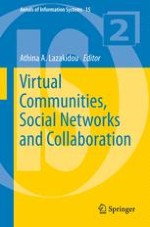2012 | OriginalPaper | Buchkapitel
2. Emergent Evaluation Criteria for Collaborative Learning Environment
verfasst von : Ibrahiem M. M. El Emary
Erschienen in: Virtual Communities, Social Networks and Collaboration
Verlag: Springer New York
Aktivieren Sie unsere intelligente Suche, um passende Fachinhalte oder Patente zu finden.
Wählen Sie Textabschnitte aus um mit Künstlicher Intelligenz passenden Patente zu finden. powered by
Markieren Sie Textabschnitte, um KI-gestützt weitere passende Inhalte zu finden. powered by
